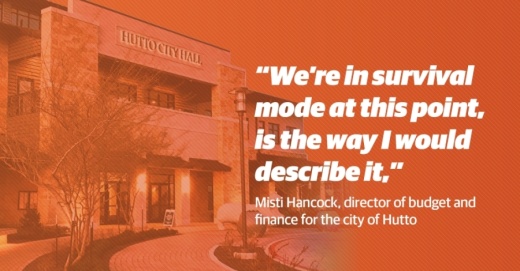In a nearly six-hour council meeting March 30, Hutto City Council revisited its budget to consider how to cut expenditures amid missed financial projections and growing coronavirus concerns.
As part of the discussion, council provided suggestions for the city’s finance department to determine where significant price cuts need to be made in order to salvage the city’s budget for the duration of fiscal year 2019-20.
As an immediate step, City Council members and the mayor suspended their monthly stipend payments for the remainder of FY 2019-20, which runs through September 30. Hutto City Council members currently receive $1,200 a month for services, and the mayor receives $1500.
Blake Roberts, senior managing consultant at PFM Financial Advisors, serves as a financial advisor to the city; he confirmed that the city’s fund balance level has been declining.
When a city is below its recommended fund balance level, Roberts said, it can affect the city’s working capital and operating liquidity, or the ability to convert assets into cash to pay for operating expenses.
The Government Finance Officers Association typically recommends maintaining a fund balance level that can cover two to three months of operating expenses. Under Hutto’s current conditions—prior to city layoffs—the city has a fund balance level equivalent to 25 days, as revealed during the 2018-19 financial audit review provided by Chief Financial Officer Michel Sorrell. The dollar equivalent to the 25-day figure was listed as roughly $1.2 million.
“It was a more pronounced decline made obvious by the FY [2018-19] audit,” Roberts said.
Roberts provided three solutions for the city to consider: borrowing working capital; restructuring its utility fund debt to provide short-term relief; and engaging a third party to assess Hutto’s current financial position and determine whether its budget is proportionate to the city’s overall size.
According to the Hutto City Charter, the city is required to maintain a general fund unassigned balance equivalent to 10% of the city’s budgeted expenditures. With a $1.2 million unassigned balance, the city is at about 7% of its budgeted $17.3 million in expenditures.
The city's FY 2019-20 budget was built off of a projected 15% sales tax revenue increase over FY 2018-19, staff confirmed.
Misti Hancock, director of budget and finance for the city, added that the city’s sales tax revenues for the month of December came back lower than projected, and she said that trend is expected to continue amid the coronavirus pandemic.
While the overall dollar amount for sales tax revenue generated in December 2019 was greater than that of December 2018, it did not meet the 15% threshold expected by staff. Hutto collected $376,000 in sales tax revenue in December 2018 and $471,000 in December 2019.
Sorrell said that while the $1.2 million does not represent the only money the city has in the bank, the city still needs to be fiscally conservative. Sorrell’s team will be revisiting where cuts can be made, she said. The highest priority, Sorrell said, is maintaining the city’s reserves to pay off its debt services and to maintain its bond rating.
Hancock also gave a financial overview of the city’s staffing growth in the past few years as well as financial changes made as a result of last week’s layoffs. The city had 103 employees in October 2017, the beginning of FY 2017-18; by the start of FY 2018-19, it had 135 employees.
The city began FY 2019-20 with a 165-person headcount, Hancock confirmed. That headcount growth marks a personnel increase of approximately 60% in two years’ time. Both Hancock and Interim City Manager Charles Daniels said 60% growth is highly unusual, adding that an increase in personnel always comes with added expenses—salary, training and benefits being just a few examples.
Hancock said the impact of Hutto's city layoffs for FY 2019-20 is approximately $1.1 million saved from the general fund, $119,000 for streets and drainage and $79,000 for utilities. Subtracting $75,000 paid out for vacation expenses, the city saved a total of approximately $1 million. But because projections indicate approximately $1 million will be lost in sales tax revenue due to COVID-19, the two cancel each other out from a financial standpoint.
Hancock said that immediate considerations on the table include sole prioritization of core, essential services. For example, with the shelter-in-place order in effect, city spokesperson Stacy Schmitt said she has cut events from the city calendar from March through May in an effort to save revenue there.
According to Hancock, the city needs to cut approximately $800,000 from its budget in order to reach the $1.7 million necessary for the charter’s prescribed figure of 10% of budget expenditures. The city’s finances department will come back to council April 16 with suggestions on budget cuts, including: reducing areas of the council fund; considering moving general fund economic deals into the city’s Economic Development Corp. budget; revisiting contracted services and potentially reducing the number of those in operation; and analyzing car allowances for city employees, among other areas.
Regarding a status change for Hutto’s laid-off employees, Schmitt said city officials are still working with state and federal agencies to determine how to administer a stimulus package and change those employees' statuses to furlough. Schmitt said her understanding is that the federal government would pay four months’ worth of salaries while the city would match employee benefits, but the program primarily applies to small businesses, and it does not clarify if municipalities qualify.
“We’re in survival mode at this point,” Hancock said.





